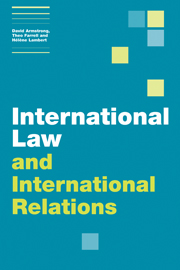7 - International trade
Published online by Cambridge University Press: 05 June 2012
Summary
The fact that most states, most of the time, observe a wide range of rules relating to international economic activities, and that they have, in recent years, been able to agree to a major expansion of the regime governing world trade in the form of the World Trade Organization (WTO) is among the clearest pieces of evidence that international law does exercise a real influence on state practice. Other important areas of economic activity that are significantly affected by rules and formal regulation include international finance, intellectual property, sea and air travel, information technology, exploitation of the resources of the sea, nationalisation of foreign owned property and much more. However, the fact that there are many generally recognised rules does not mean that this area is free from controversy. Tensions range from such fundamental issues as the Third World call for the right to development and economic redistribution, to numerous trade disputes and difficult questions arising out of intellectual property law (such as the right of Third World countries to produce cheaper versions of various anti-AIDS medicines, the patents for which are owned by Western pharmaceutical companies). Hence international economic law, both as specific rules and in terms of the more profound issues it raises, is at the heart of the contemporary world order.
However, until quite recently, the legal regulation of economic affairs did not enjoy the same ‘glamour’ or ‘media attention’ as other fields of public international law, such as use of force or human rights.
- Type
- Chapter
- Information
- International Law and International Relations , pp. 222 - 252Publisher: Cambridge University PressPrint publication year: 2007



